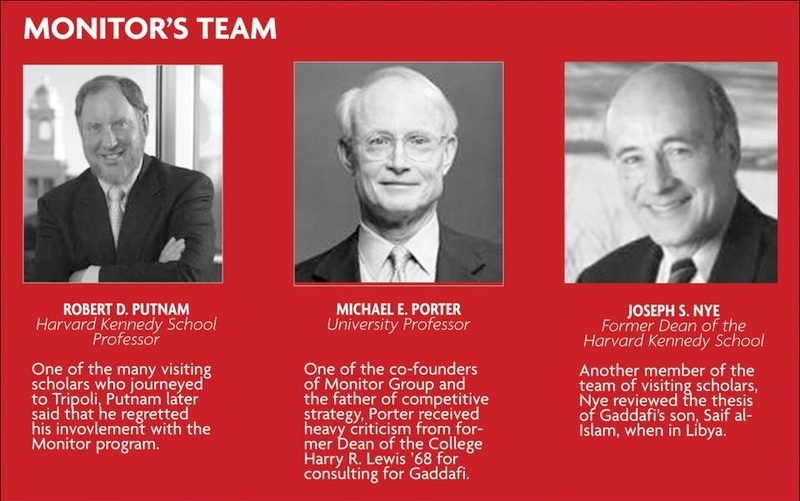Back in 2006, Libyan dictator Muammar Gaddafi had a PR problem. Having acquired a decades-old reputation as a sponsor of terrorism and an oppressor of his own people, Gaddafi wanted the West to see him in a more positive light.
So he turned to a Cambridge-based consulting firm called Monitor Group, a company co-founded by Harvard Business School professors and closely affiliated with prominent faculty members. They were an effective bunch.
They flew Western intellectuals out to Libya who then returned home to wax poetic in the American media about Libya’s political reforms.
They compiled a report, which affirmed that Libya was the world’s “only functioning example of direct democracy on a national level.”
But today, as a civil war rages in Libya, those experts who coordinated the project and who participated face an image problem of their own.
As the world has turned its attention to the upheaval in the troubled North African nation, the academic community is scrutinizing the activity of several professors who worked with Gaddafi’s regime—and, in one case, helped with his son’s dissertation—as consultants or guests of Monitor Group.
In the wake of the revelations, some Harvard faculty members are encouraging the University to publicly find fault with at least one of its most prominent professors.
Former Dean of the College Harry R. Lewis ’68 is foremost among those calling for Harvard to respond to the work of University Professor Michael E. Porter, a Monitor co-founder and a co-author of the report that called Gaddafi’s Libya a “popular” democracy, an analysis from a top academic that recent history shows was greatly flawed.
CONSULTING FOR A DICTATOR
When Libya contracted Monitor, the firm produced a 79-page slideshow mostly analyzing Libya’s economy.
But Harvard professors have focused on the political conclusions of the report, which, among a set of recommendations, indicated that Libya was a functioning democracy and heralded the country’s system of local political gatherings as “a meaningful forum for Libyan citizens to participate directly in law-making.”
The report was a product of Monitor’s work consulting for Gaddafi from 2006 to 2008. The Libyan government—headed by Gaddafi, who has ruled since a 1969 military coup—hired consultants from Monitor Group to provide policy recommendations, economic advice, and several other services.
The consulting group carries a distinct Harvard flavor. On its website, the company touts the Harvard ties of several of its founders and current leaders.
Of the 16 “thought leaders” who head the company, six mention positions at Harvard—mostly at the Business School—in their biographies on the company website.
Lewis has focused the discussion on Porter, who has come under the most intent critical gaze among the professors involved due to his high positions in both the company and the University. At Harvard, he holds the University’s most prestigious faculty position as a University Professor, a cadre that includes Paul E. Farmer, Henry Louis Gates Jr., and Lawrence H. Summers.
Read more in News
'And Now, Now We're Here'













